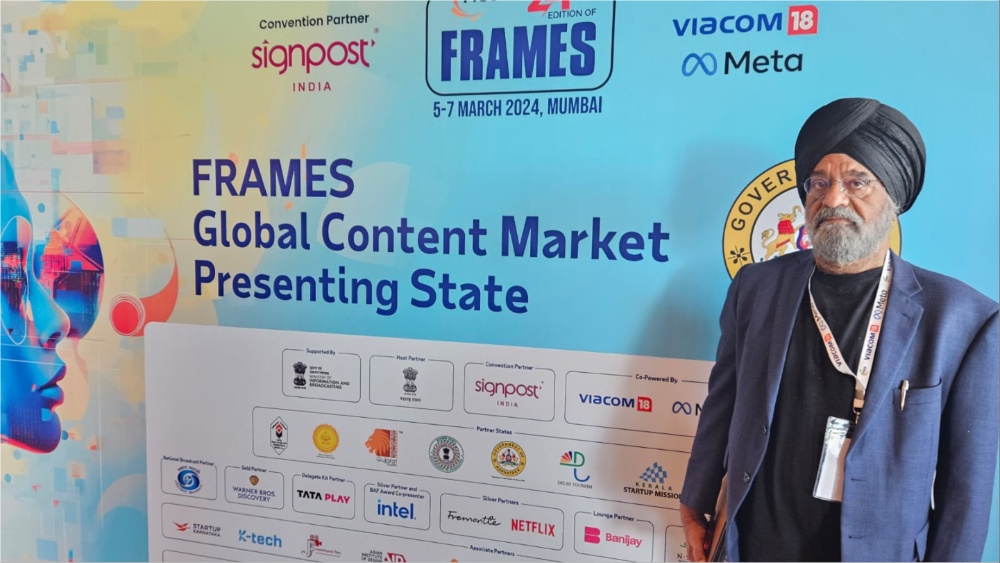India’s Frames Market Blooms Under Guidance of Bobby Bedi
The B2B meetings at Mumbai’s annual Frames media conference have now bloomed into the full-fledged Global Content Market under the guidance of veteran producer Bobby Bedi.
Bedi’s credits include some of the landmark titles of Indian cinema, including Shekhar Kapur’s international breakthrough film “Bandit Queen” (1994), Deepa Mehta’s controversial “Fire” (1996), Rani Mukerji-starring relationship drama “Saathiya” (2002), Vishal Bhardwaj’s “Macbeth” adaptation “Maqbool” (2003), Stanley Tong’s Jackie Chan starrer “The Myth” (2005) and Gurvinder Singh’s Rotterdam title “Crescent Night” (2002).
The market, which was buzzing from the get go, boasted a significant international presence from the U.K., Korea, Turkey, Spain, Germany and Saudi Arabia, besides a sizeable Indian contingent. Bedi said that the word ‘Asian’ suggests mainly content from the Far East and the Frames market plugs the gap for South Asian and Middle Eastern content. Differentiating the market from the Indian government’s Film Bazaar in Goa, Bedi says that that market is part of a film festival mostly populated by filmmakers, whereas the focus in Mumbai, the capital of the Bollywood film industry, is about commerce. Frames is organized by the Federation of Indian Chambers of Commerce and Industry (FICCI).
“Everybody here [in Mumbai] is only in the business of entertainment. We don’t have any stars. These are people who are coming here because either they want to learn something, or they want to impart something or promote something,” Bedi told Variety. The producer points to the list of companies supporting or sponsoring Frames, that include Viacom18, Meta, Netflix, Fremantle and Banijay, in addition to the Indian government.
“We’re invited people from Red Sea Film Fund, who are seriously looking to pepper 2025 with Indian content,” Bedi said. “The Middle East is an Indian buyer. These guys are interested in product from here because there are vast populations in the Middle East that come from India, Pakistan, Bangladesh. It’s not as if you’re coming from France and looking at some arthouse Indian film.”
Bedi added that the heavyweight Spanish delegation was actively looking at co-productions with India, besides buying and selling at the market. Ulf Israel, producer of 2024 Berlinale prize-winning “Dying” was also a market attendee.
While details of deals at the market are yet to be revealed, Bedi himself has struck two. He has signed a deal with a Saudi Arabian company to adapt one of his iconic films in Arabic, with a local writer and what he describes as a “very big musical project.” “We believe that for entertainment to succeed in the Middle East, it must originate there, not from the West, not from here,” Bedi said.
The market is being lauded by international participants. “It has been great returning to FICCI Frames after an absence of more than 10 years. As the only Indian market covering both film and television, it is a great opportunity to find out about the state of the Indian market and meet a variety of Indian producers and storytellers,” Lee Stone, partner at the U.K.’s Lee & Thompson told Variety. “Now that there is an Indian tax rebate available for Indian co-productions and foreign films shot in India, I hope that more foreign co-producers, distributors and financiers can be incentivized to attend future FICCI Frames markets and that there can be more panels (and even workshops) aimed at bridging the gap between the Indian film and television-making communities and those of the rest of the world, such as sessions on international distribution or how international film finance works.”
Xavier Henry-Rashid, of sales agent Film Republic, added, “FICCI offers a great insight into the fast-moving Indian film scene, and there are definitely a couple projects at the market which we’ll be following closely. Outside of the mainstream local productions, there are still some steps needed to bring the [independent] films to foreign markets, and I think this is a good place for filmmakers to develop those networks and international collaborators.”
Korea-based consultant Wonsun Shin said, “Keen interest in global film industry dynamics, distinct departure from traditional Bollywood norms, FICCI Frames Global Content Market 2024 is a positive change and welcome initiative.”

